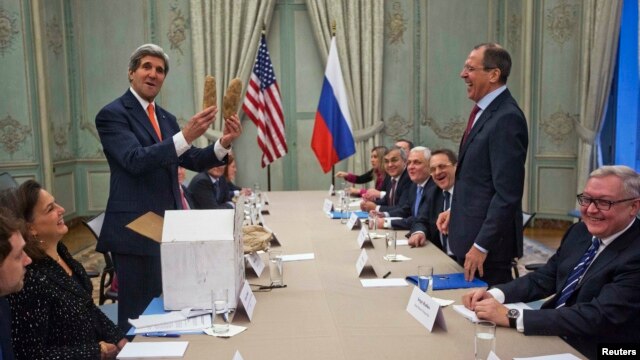U.S., Russia discuss Syria cease-fire, prisoner exchange
| Publisher | Radio Free Europe/Radio Liberty |
| Publication Date | 13 January 2014 |
| Cite as | Radio Free Europe/Radio Liberty, U.S., Russia discuss Syria cease-fire, prisoner exchange, 13 January 2014, available at: https://www.refworld.org/docid/52e65b223.html [accessed 1 June 2023] |
| Disclaimer | This is not a UNHCR publication. UNHCR is not responsible for, nor does it necessarily endorse, its content. Any views expressed are solely those of the author or publisher and do not necessarily reflect those of UNHCR, the United Nations or its Member States. |
January 13, 2014
 U.S. Secretary of State John Kerry (standing left) holds up a pair of Idaho potatoes as a gift for Russian Foreign Minister Sergei Lavrov (standing right) at the start of their meeting at the U.S. ambassador's residence in Paris on January 13.
U.S. Secretary of State John Kerry (standing left) holds up a pair of Idaho potatoes as a gift for Russian Foreign Minister Sergei Lavrov (standing right) at the start of their meeting at the U.S. ambassador's residence in Paris on January 13.
The United States and Russia have discussed the possibility of organizing a cease-fire in Syria in the run-up to peace talks in Switzerland next week.
Speaking after talks with Russian Foreign Minister Sergei Lavrov in Paris on January 13, U.S. Secretary of State John Kerry said the cease-fire could be "localized," possibly in the city of Aleppo.
Kerry and Lavrov expressed hope that a cease-fire could be in place before the January 22 peace conference, dubbed "Geneva-2," along with plans for prisoner exchanges and the opening of humanitarian corridors.
"We also discussed the possibility of prisoner exchanges and we have discussed that with the opposition," Kerry said. "The opposition has declared that they are prepared to put together lists. They are prepared to entertain such an exchange."
But Lavrov insisted these issues would not be a precondition to the talks.
He said Damascus had indicated it might provide access for humanitarian aid to besieged areas, citing the Damascus suburb of East Ghouta, where the United Nations says 160,000 people have been trapped by fighting.
"We await similar steps by the opposition," Lavrov added.
Lavrov also questioned whether the Western-backed opposition, which has not yet agreed to attend the peace talks, was willing or able to carry out agreements in the face of intense infighting that has pitted Al-Qaeda-linked militants against more moderate factions.
On the subject of Iran's participation in the peace talks, Lavrov reiterated Russia's support for the country taking part.
"Ensurance of the representative nature of external actors that are to be invited to the [Geneva 2] conference is no less important," Lavrov said. "In this regard, we find the participation of such countries as Iran and Saudi Arabia in Geneva-2 an absolutely obvious necessity. We hope that at the end, [UN] Secretary-General [Ban Ki-moon] – and he is the one who sends out invitations to the conference – will deliver invitations to all those whom the real development of the situation on the ground [in Syria] depends upon."
Kerry said Tehran could take part, but only if it agrees to earlier diplomatic agreements that any transitional government in Syria would not include President Bashar al-Assad or his close allies.
Iran's ambassador to Russia said Foreign Minister Mohammad Javad Zarif would travel to Moscow on January 16 for talks with President Vladimir Putin.
The United States and Russia have discussed the possibility of organizing a cease-fire in Syria in the run-up to peace talks in Switzerland next week.
Based on reporting by dpa, AP, Reuters, and AFP
Link to original story on RFE/RL website
